Game developers are the architects of virtual worlds, creating immersive experiences that captivate players. They combine creativity with technical skills to design, develop, and test games across various platforms.
Game development skills encompass proficiency in programming languages like C++ and C#, familiarity with game engines such as Unity and Unreal Engine, and abilities in areas like storytelling, problem-solving, and teamwork.
Candidates can write these abilities in their resumes, but you can’t verify them without on-the-job Game Developer skill tests.
In this post, we will explore 9 essential Game Developer skills, 9 secondary skills and how to assess them so you can make informed hiring decisions.
Table of contents
9 fundamental Game Developer skills and traits
The best skills for Game Developers include Programming Proficiency, Game Engine Expertise, Mathematical Skills, Problem Solving, Graphics Programming, AI Programming, Network Programming, Audio Programming and Version Control.
Let’s dive into the details by examining the 9 essential skills of a Game Developer.
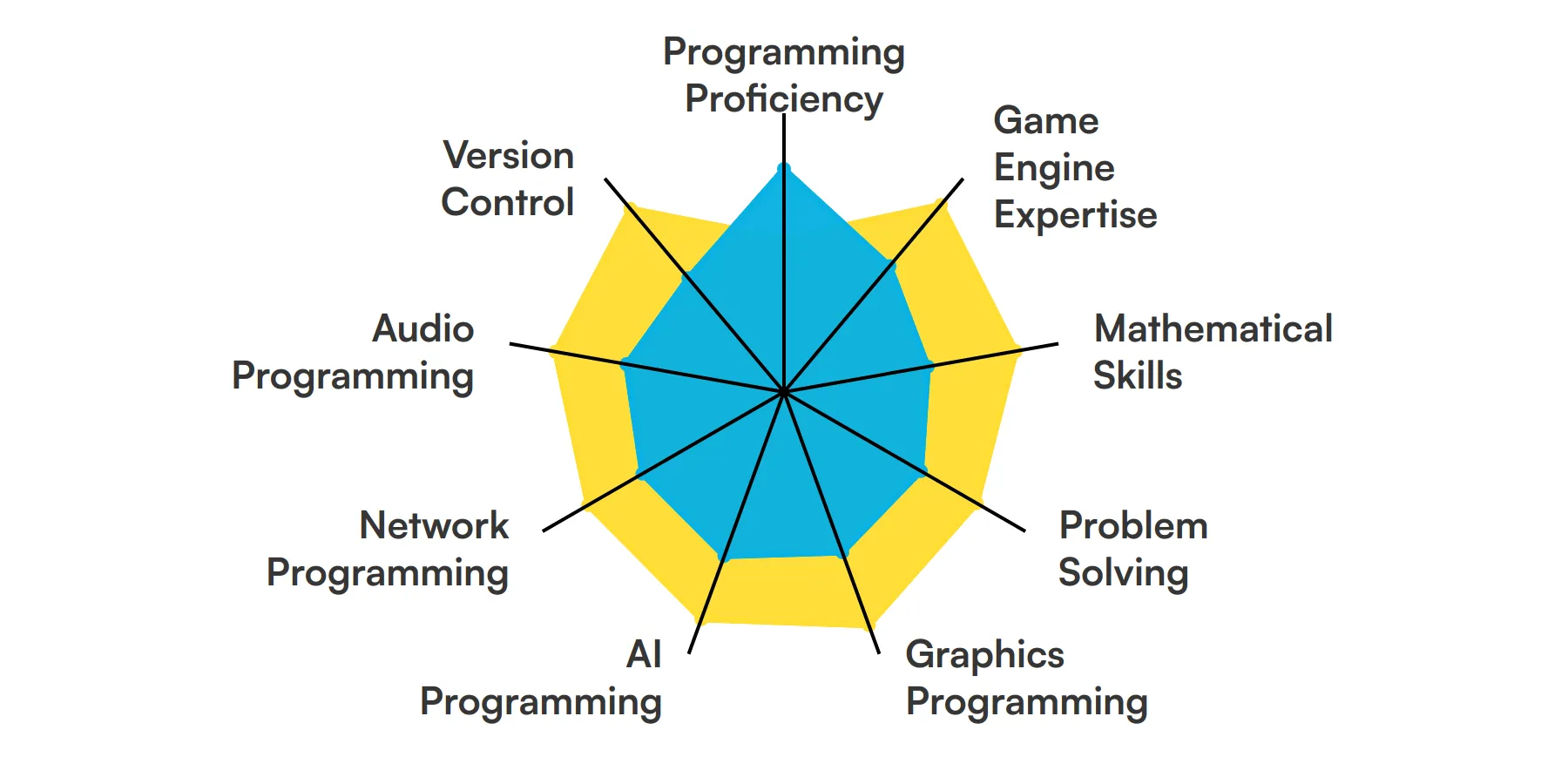
Programming Proficiency
A game developer must be adept in programming languages such as C++, C#, and Python. These languages are the backbone of game development, enabling the creation of complex game mechanics and interactions.
For more insights, check out our guide to writing a Software Developer Job Description.
Game Engine Expertise
Understanding and utilizing game engines like Unity or Unreal Engine is crucial for a game developer. These platforms provide the tools necessary to build and optimize the visual and physical aspects of games.
Mathematical Skills
Strong knowledge in mathematics, especially in linear algebra and calculus, is essential for game physics and graphics programming. These skills help a game developer to simulate realistic environments and character movements.
Problem Solving
Game development involves tackling complex problems and bugs. A developer needs to be able to think logically and creatively to find effective solutions and ensure the game runs smoothly.
Check out our guide for a comprehensive list of interview questions.
Graphics Programming
Specialized knowledge in graphics programming is necessary to handle rendering, shading, and texturing within a game. This skill ensures that the game not only functions well but also looks visually appealing.
AI Programming
Artificial intelligence programming is used to develop complex behaviors in non-player characters (NPCs) within games. This skill allows for the creation of more engaging and challenging gameplay.
Network Programming
For multiplayer games, understanding network programming is essential. This skill ensures that games have the capability for real-time interactions and connectivity between players online.
Audio Programming
Integrating sound effects and music seamlessly into game environments enhances player immersion. A game developer must understand how to implement and manipulate audio elements effectively.
Version Control
Familiarity with version control systems like Git is important for managing changes to the game project. This skill helps in tracking progress and collaborating efficiently with other team members.
9 secondary Game Developer skills and traits
The best skills for Game Developers include Scripting, User Interface Design, Project Management, Testing and Debugging, Storytelling, Animation, Level Design, Localization and Performance Optimization.
Let’s dive into the details by examining the 9 secondary skills of a Game Developer.
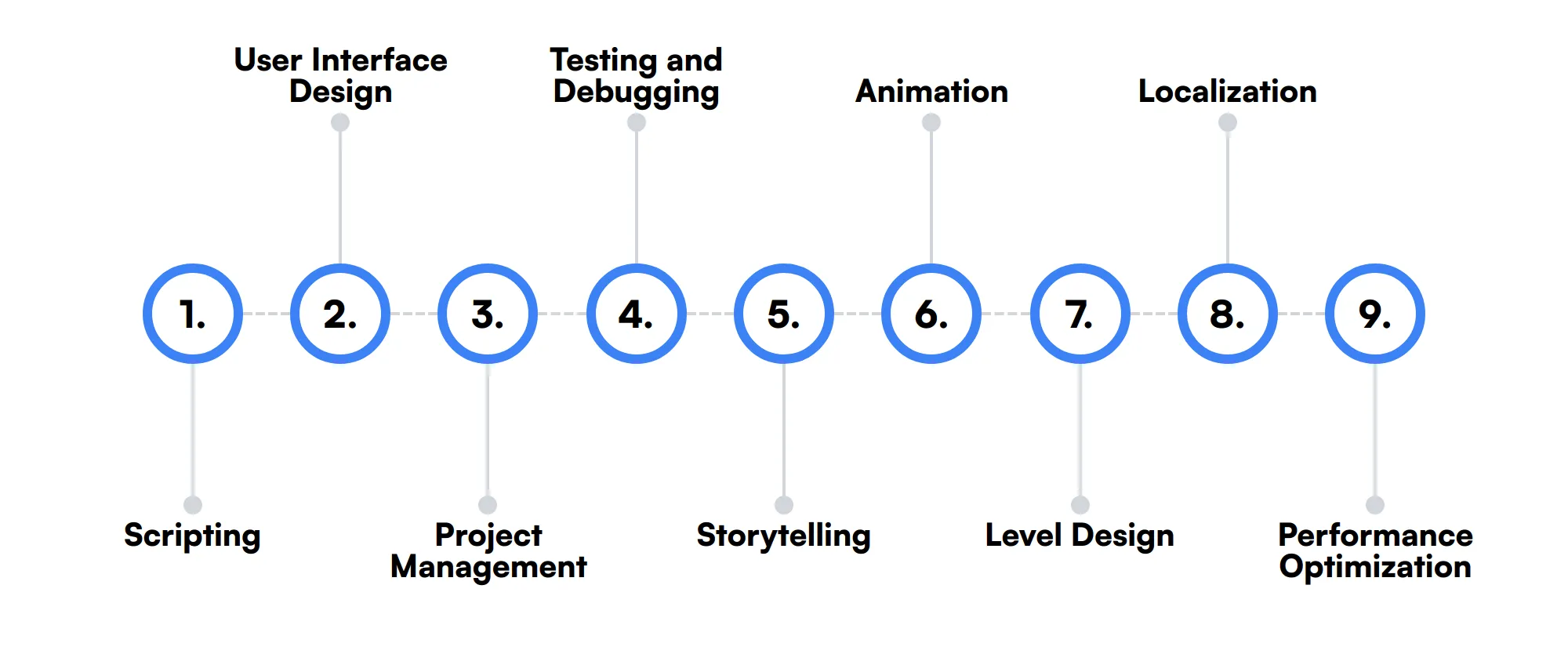
Scripting
Scripting languages like Lua are used for writing lighter and less complex code for various game elements, which can be crucial for tasks like customizing character actions and game logic.
User Interface Design
Designing intuitive and attractive user interfaces is important to ensure a good user experience. This involves creating accessible menus, buttons, and other interactive elements.
Project Management
Organizing and managing the development process, from initial concept to final release, ensures that the game is completed on time and within budget.
Testing and Debugging
A game developer must regularly test the game to find and fix bugs or glitches. Effective debugging prevents issues from affecting the end-user experience.
Storytelling
Crafting compelling narratives and character arcs can significantly enhance the depth and engagement of a game. This skill is particularly important in role-playing and story-driven games.
Animation
Skills in animation are necessary to bring characters and environments to life, making the game more realistic and enjoyable for players.
Level Design
Creating engaging and balanced game levels is key to game playability. This involves planning the layout, challenges, and progression to keep players interested.
Localization
Adapting the game for different languages and cultures can expand the market reach. This includes translating text and adjusting cultural references to suit various audiences.
Performance Optimization
Optimizing game performance for various platforms ensures smooth gameplay and accessibility to a wider audience, which involves refining code and graphics settings.
How to assess Game Developer skills and traits
Assessing the skills and traits of a game developer can be a challenging task, given the diverse range of expertise required in this field. From programming proficiency and game engine expertise to mathematical skills and problem-solving abilities, a game developer must possess a well-rounded skill set to excel. It's not just about knowing how to code; it's about understanding the intricacies of game design and development.
Traditional resumes and portfolios can provide some insight into a candidate's background, but they often fall short in revealing the true depth of their capabilities. This is where skills-based assessments come into play. By leveraging tools like Adaface on-the-job skill tests, you can gain a clearer picture of a candidate's competencies, leading to a 2x improved quality of hires and an 85% reduction in screening time.
When assessing game developers, it's important to evaluate their proficiency in key areas such as graphics programming, AI programming, network programming, and audio programming. Additionally, familiarity with version control systems is crucial for collaborative projects. By focusing on these specific skills, you can ensure that your candidates are well-equipped to handle the demands of game development.
Let’s look at how to assess Game Developer skills with these 5 talent assessments.
C Online Test
Our C Online Test evaluates candidates on their fundamental knowledge of C programming, from basic syntax to complex concepts like pointers and file handling.
The test assesses understanding of data types, control structures, functions, arrays, and advanced topics such as dynamic memory and file operations.
Candidates who perform well demonstrate their ability to solve problems using C, manage memory efficiently, and understand complex programming constructs.
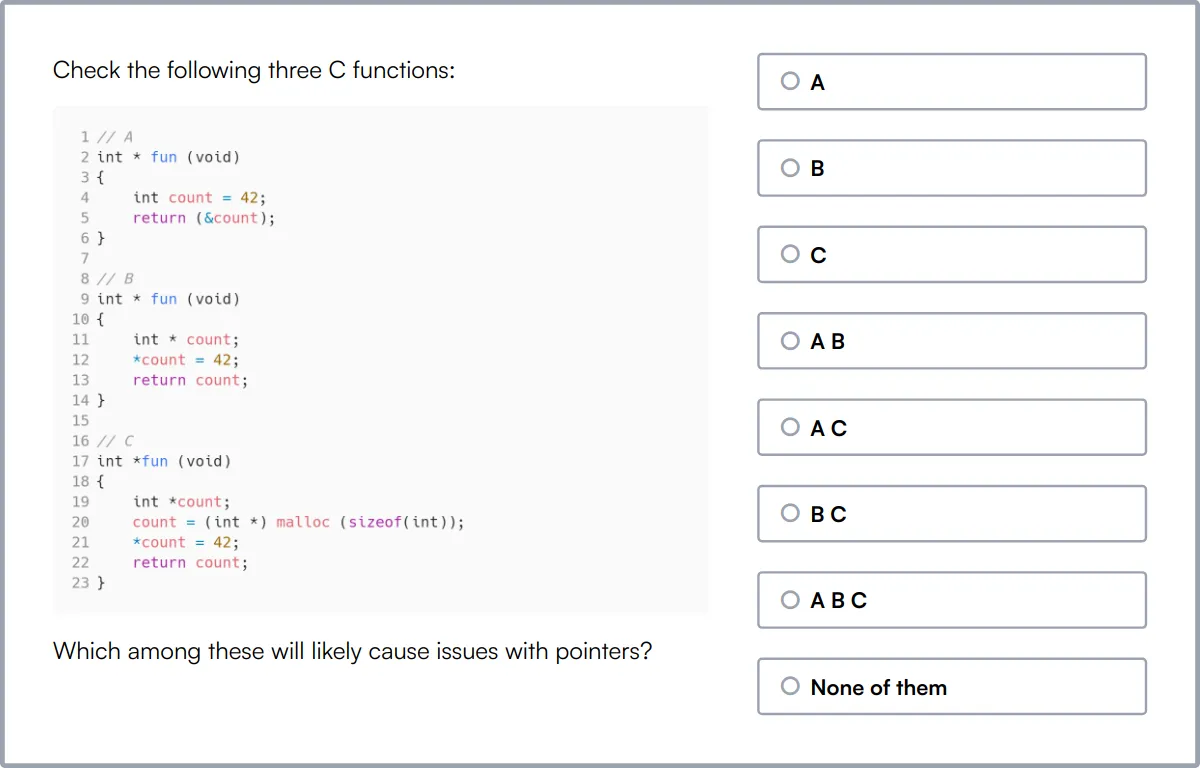
Excel & Data Interpretation Test
Our Excel & Data Interpretation Test measures a candidate's proficiency in using Excel for data manipulation and their ability to interpret and draw insights from data.
This test evaluates skills in using basic to advanced Excel formulas, data analysis with pivots and filters, and the ability to visualize data effectively.
High-scoring candidates will excel in extracting meaningful insights from complex data sets and presenting data in a clear, actionable format.
Problem Solving Test
Our Problem Solving Test challenges candidates to demonstrate their analytical and reasoning abilities through a variety of complex scenarios.
The test covers abstract, critical, and spatial reasoning, along with pattern matching and data interpretation, to gauge problem-solving skills.
Successful candidates will show a strong ability to process information, analyze situations, and develop appropriate solutions under pressure.
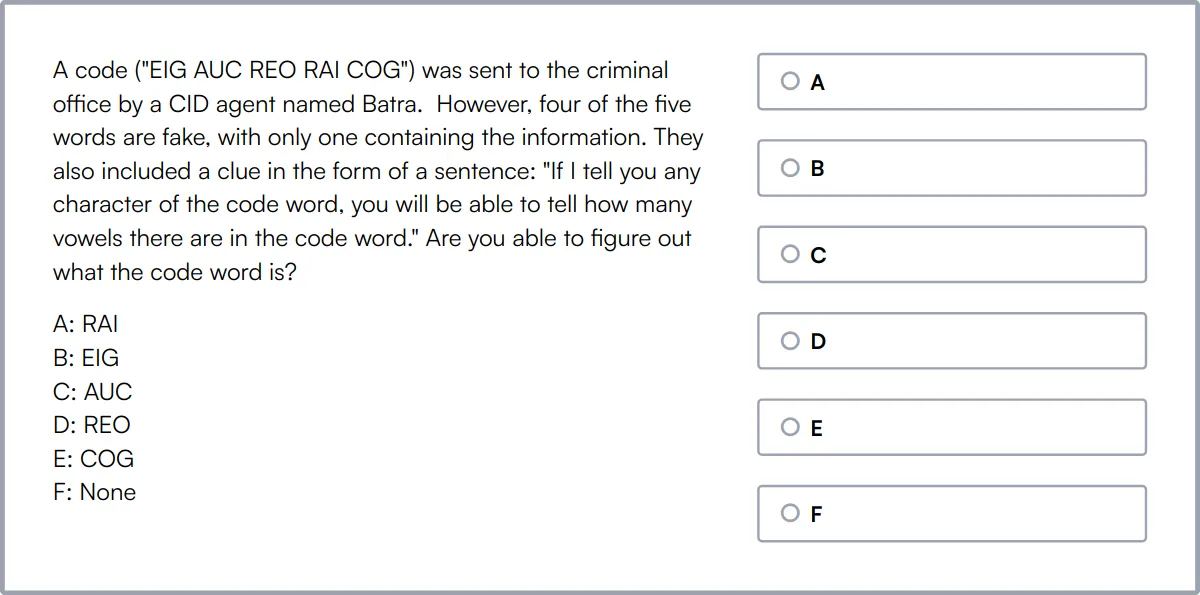
Deep Learning Online Test
Our Deep Learning Online Test assesses a candidate's understanding of deep learning concepts and their application in areas like computer vision and natural language processing.
It evaluates knowledge of neural networks, backpropagation, convolutional and recurrent neural networks, and other advanced topics such as GANs and transfer learning.
Candidates excelling in this test are proficient in implementing and optimizing deep learning models, demonstrating their readiness for complex AI projects.
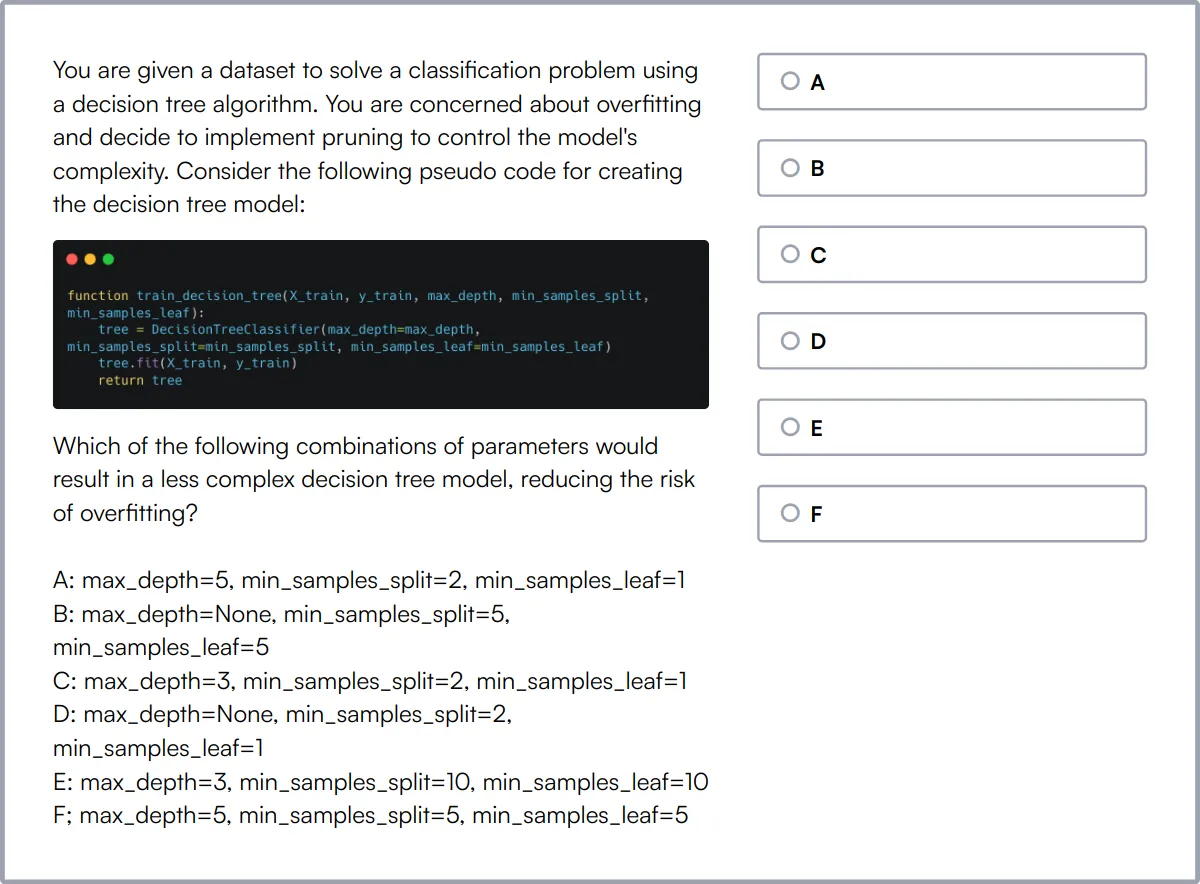
Git Online Test
Our Git Online Test evaluates a candidate's proficiency with Git, focusing on everything from basic commands to complex branching and merging scenarios.
The test examines knowledge of repository management, conflict resolution, and the use of Git in a collaborative project environment.
A high score indicates a candidate's strong capability in source code management and their adeptness at using Git in real-world software development workflows.
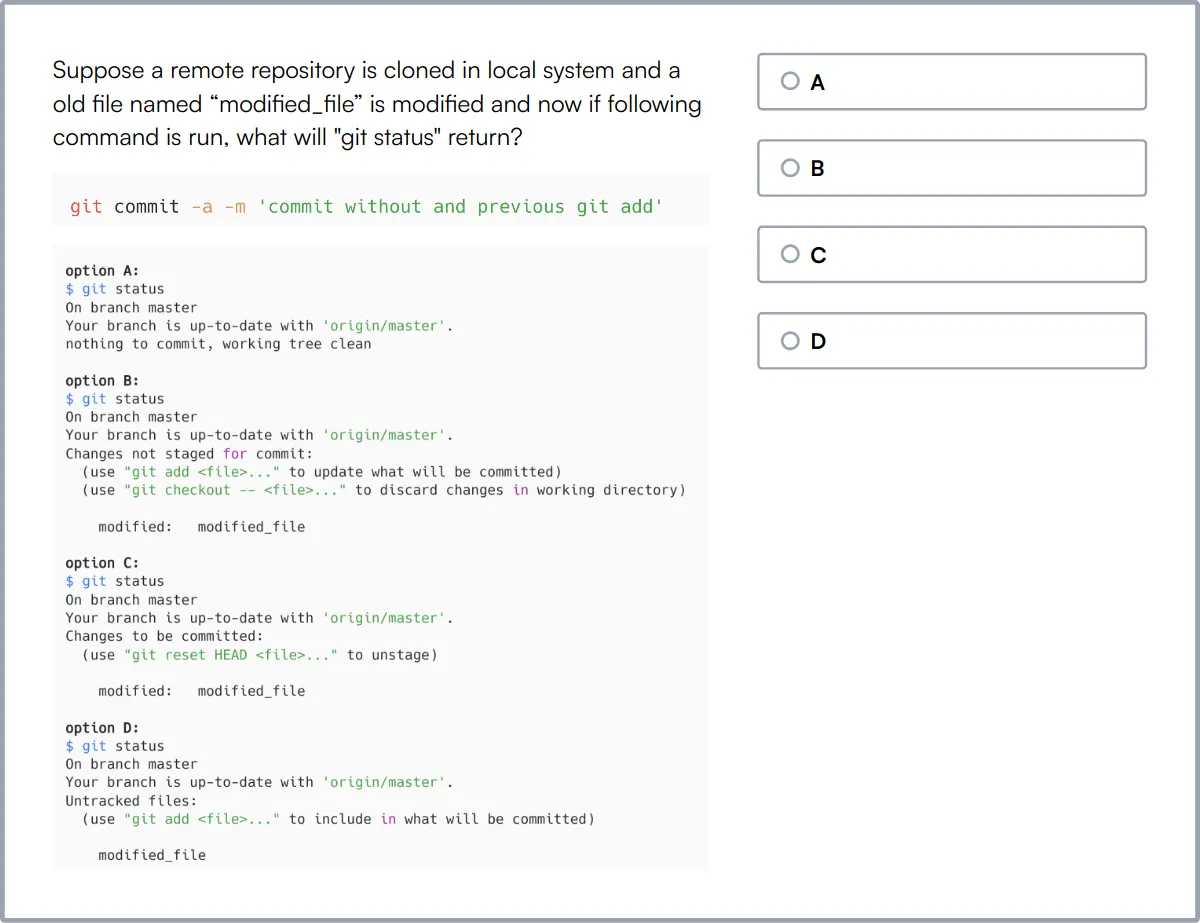
Summary: The 9 key Game Developer skills and how to test for them
| Game Developer skill | How to assess them |
|---|---|
| 1. Programming Proficiency | Evaluate coding skills through coding challenges or technical interviews. |
| 2. Game Engine Expertise | Assess experience with engines like Unity or Unreal through project reviews. |
| 3. Mathematical Skills | Test understanding of algorithms, physics, and linear algebra. |
| 4. Problem Solving | Present complex scenarios to gauge analytical and creative solutions. |
| 5. Graphics Programming | Review knowledge of shaders, rendering techniques, and graphics APIs. |
| 6. AI Programming | Check ability to implement pathfinding, decision trees, and behavior algorithms. |
| 7. Network Programming | Evaluate skills in creating multiplayer systems and handling network protocols. |
| 8. Audio Programming | Assess experience with sound integration and audio middleware. |
| 9. Version Control | Review proficiency with Git or other version control systems. |
C Online Test
Game Developer skills FAQs
What programming languages should a game developer know?
Game developers should be proficient in languages like C++, C#, and Python. These languages are commonly used in game development for various tasks.
How can I assess a candidate's game engine expertise?
Ask candidates about their experience with popular game engines like Unity or Unreal Engine. Request examples of projects they've worked on using these engines.
Why are mathematical skills important for game developers?
Mathematical skills are essential for tasks like physics simulations, graphics programming, and AI development. They help in creating realistic and engaging game experiences.
What is the role of AI programming in game development?
AI programming is used to create intelligent behaviors in non-player characters (NPCs). It enhances gameplay by making NPCs more realistic and challenging.
How do you evaluate a game developer's problem-solving skills?
Present candidates with real-world scenarios or coding challenges related to game development. Assess their approach to identifying and solving these problems.
What tools are used for version control in game development?
Version control tools like Git and Perforce are commonly used. They help manage changes to the game's codebase and assets, facilitating collaboration among team members.
Why is user interface design important in game development?
User interface design ensures that players can interact with the game intuitively. A well-designed UI enhances the overall user experience and accessibility.
How can I assess a candidate's experience with performance optimization?
Ask about specific techniques they've used to optimize game performance, such as memory management, frame rate optimization, and reducing load times. Request examples from their past projects.

40 min skill tests.
No trick questions.
Accurate shortlisting.
We make it easy for you to find the best candidates in your pipeline with a 40 min skills test.
Try for freeRelated posts
Free resources



